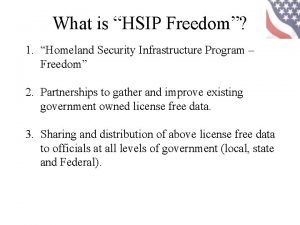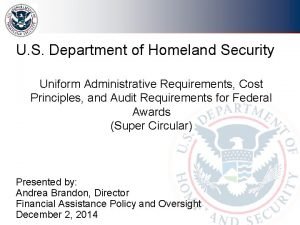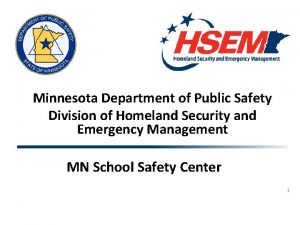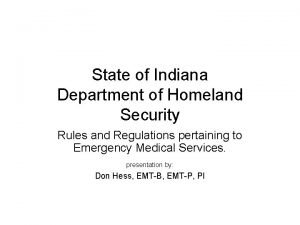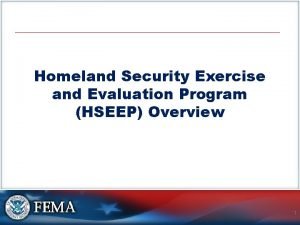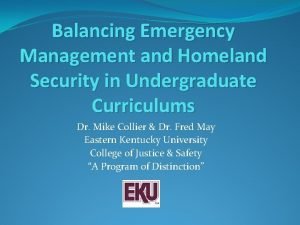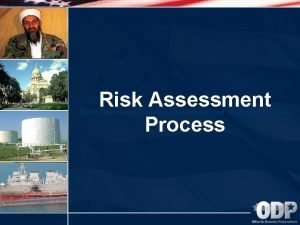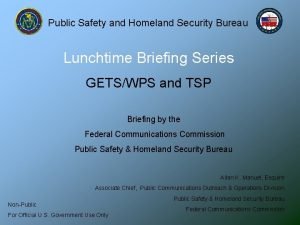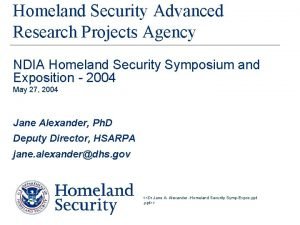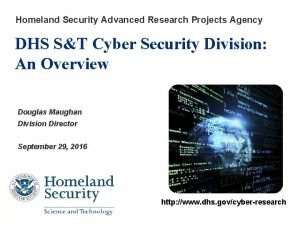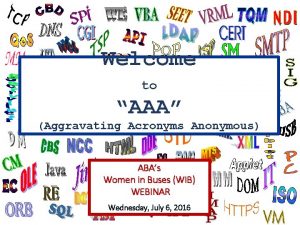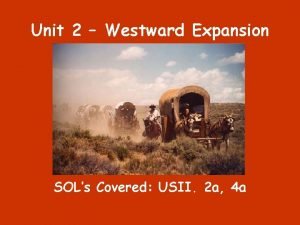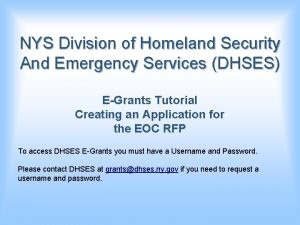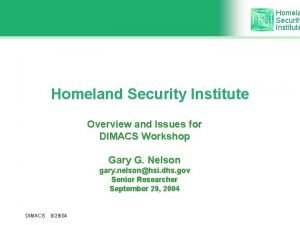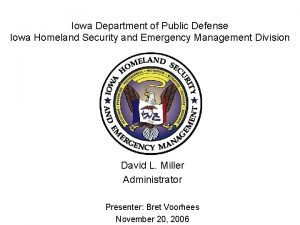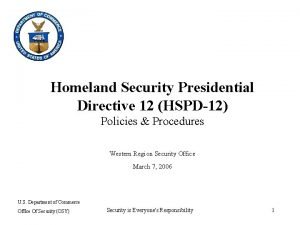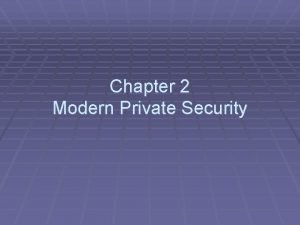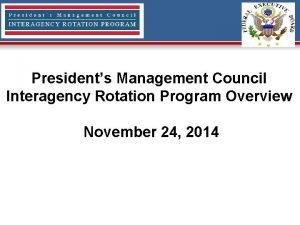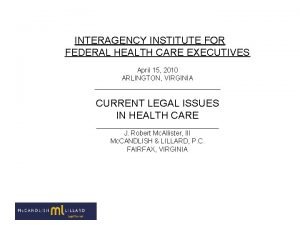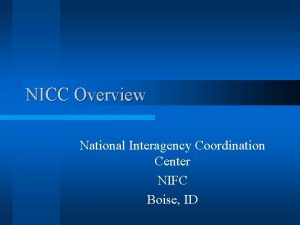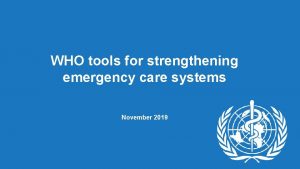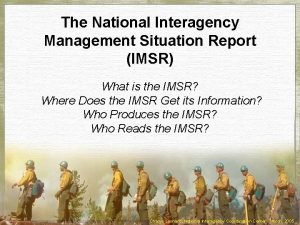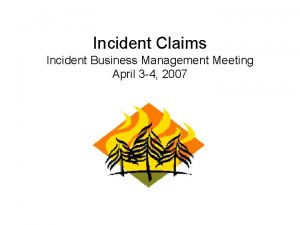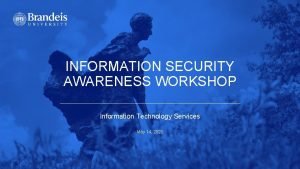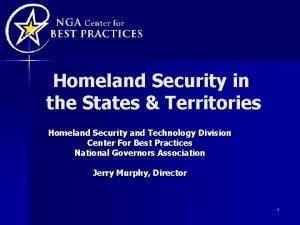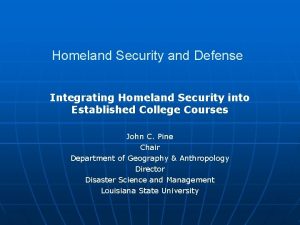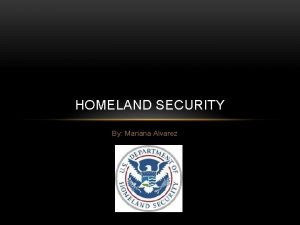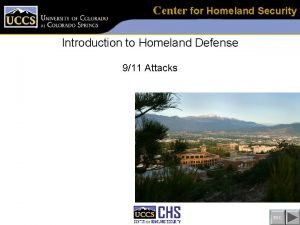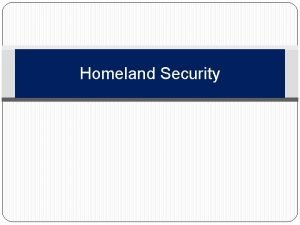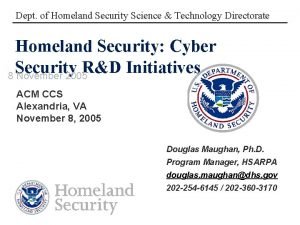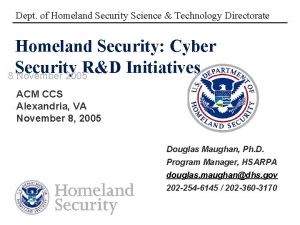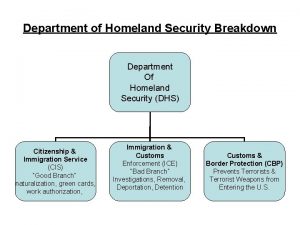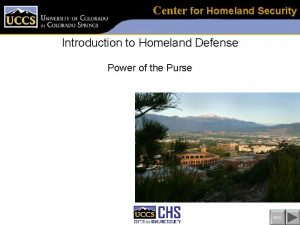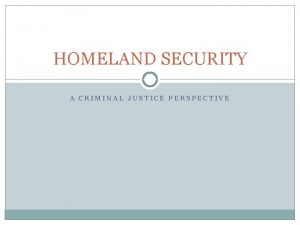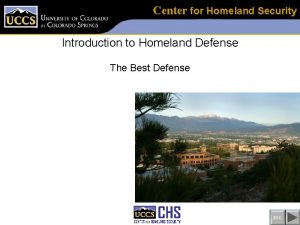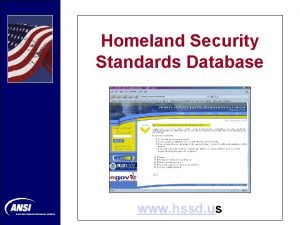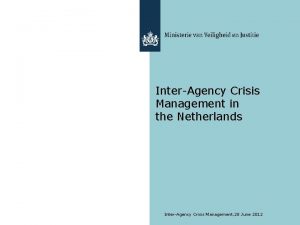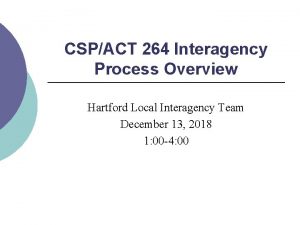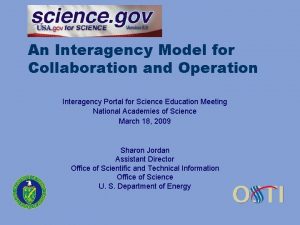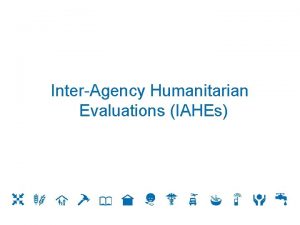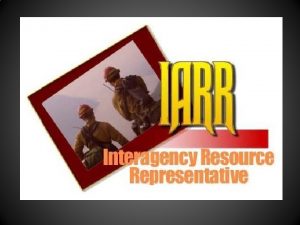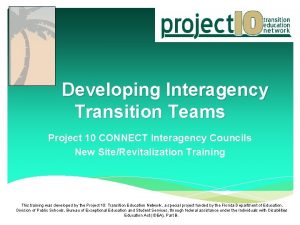Course Workshop Interagency Relationships in Homeland Security Homeland


























- Slides: 26

Course Workshop: Interagency Relationships in Homeland Security Homeland Defense and Security Education Summit George Mason University February 28, 2007 Dr. Dale Jones Associate Professor of Public Administration Director, National Homeland Security Project Virginia Commonwealth University

Workshop Agenda • • • What This Course Is About Why This Course Should be Taught How This Course Was Taught Collaboration in the Public Sector Updating the Course for the Future Audience Questions, Ideas, and Recommendations • Homeland Security (HLS) Course Exercise

What This Course Is About • • • “Interagency Relationships in HLS” Course genesis HLS Spectrum Course basis Possible course titles Graduate-level courses

Course Basis Homeland security is about government organizations managing and implementing public programs.

Possible Course Titles • • • “Public Administration for HLS” “Public Management for HLS” “Organization Theory for HLS” “Multi-Agency HLS Implementation” “Interagency Relationships in HLS” “__________ for HLS”

Course Has Mixed Presence in Graduate HLS Programs • Johns Hopkins University – Graduate Certificate in Homeland Security • Long Island University – M. S. in Homeland Security Management • Michigan State University – Certificate in Homeland Security Studies • Naval Postgraduate School – M. A. in Homeland Security • University of Denver – M. A. in Homeland Security • Virginia Commonwealth University – M. A. in Homeland Security and Emergency Preparedness

Question Given that 180, 000 employees from 22 federal agencies were merged into DHS, what is there a need to focus on somewhere in a HLS curriculum?

Why This Course Should be Taught • Views on HLS education • Expanded course basis • Reasons to include course in a graduate-level HLS curriculum – HLS challenges and areas for research – Principal topics of HLS education – Core curriculum recommendations – Hurricane Katrina lessons learned

Views on HLS Education • • Evolving HLS discipline/field Wide variety of programs and courses No one dominant approach State of affairs has intellectual freedom which is healthy and beneficial • Ongoing discussions about core content areas, themes, and topics

Expanded Course Basis Homeland security is about government organizations—which manage and implement public programs—working together across boundaries to ensure the security of the nation.

Reason #1: HLS Challenges & Areas for Research • 10 HLS challenges #10: Operating with enhanced interagency relationships and intergovernmental relations. • 15 HLS areas for research #11: Collaborative relationships through partnerships and networks.

Reason #2: Principal Topics of HLS Education #10: Organization of HLS #11: Sociology of HLS #12: Systems Integration & Administration of HLS #28: Federalism #33: Decision-Making #35: Interagency Coordination #36: Leadership #38: Politics of HLS

Reason #3: Core Curriculum Recommendations • HLS/HLD Education Consortium • Graduate-Level Standards Committee • Minimum areas of competency – Current and Emerging Threats – Context and Organizations – Policies, Strategies, and Legal Issues – Processes and Management

Reason #4: Hurricane Katrina Lessons Learned • Recommendation #112: Establishment of HLS professional development program • Recommendation #113: Establishment of career development process with interagency and intergovernmental assignments

How This Course Was Taught • • Syllabus Delivery, semesters, and students Student demographics Course objectives Major course streams Course topics Variations of relationships and collaboration • Key definitions

Variations of Relationships and Collaboration • Within an agency • Among agencies • Among federal, state, and local governments • Between civilian and military sectors • Among public, private, and nonprofit sectors • Among nations

Emphasis in U. S. Northern Command Strategic Vision (2003) • • “new challenge…interagency integration” “work with its key interagency partners” “extensive interagency involvement” “strengthen interagency relationships” “new ways…interagency environment” “Do. D leader in interagency operations” “Establish extensive interagency liaison” “cross multiple interagency lines”

U. S. Northern Command Resident Agency Partners • DHS Senior Representative • Central Intelligence Agency • Department of State • Federal Aviation Administration • Federal Bureau of Investigation • Federal Emergency Management Agency • Customs & Border Protection – Air & Marine Operations • National Laboratories • Transportation Security Administration • US Coast Guard • US Geological Survey • Canadian Forces Chaplain • Canadian Political Advisor to NORAD • Canadian Public Health Liaison Officer

U. S. Northern Command Local Area Agency Partners • Citizenship and Immigration Services • Customs and Border Protection • Department of Interior – Bureau of Reclamation • Department of Transportation • Department of Health and Human Services • Environmental Protection Agency • Federal Air Marshal Service • General Services Administration • Humanitarian International Services Group • National Aeronautics and Space Administration • National Disaster Medical System • National Oceanic Atmospheric Administration • Office of Transportation Vetting Credentials • US Department of Agriculture

Key Definitions • • Intergovernmental relations (IGR) Interagency coordination Interagency relationships Partnering Networks Collaboration Collaborative public management

Collaboration in the Public Sector • Increase in collaborative public management • Recognition of need to “work together” • Evidence of importance of intergovernmental relations, networks, and collaboration

Evidence of Importance • National Academy of Public Administration (NAPA) • IBM Center for The Business of Government • Government Accountability Office (GAO) • Public Administration Review

Updating the Course for the Future • What necessitates updating course? • What key events occurred since course last taught in spring 2006? • What new content should be in the course? • What textbook changes should be made?

Audience Participation • Questions • Ideas • Recommendations

HLS Course Exercise • Form into small groups • Use Bellavita and Gordon list of 51 HLS topics • Identify 4 -5 courses for HLS Certificate • Identify 4 -6 core courses for MA in HLS

Thank you! Dale Jones, Ph. D. Virginia Commonwealth University 804 -827 -0925 vdjones@vcu. edu
 Homeland security infrastructure program
Homeland security infrastructure program Homeland security uniform
Homeland security uniform Department of homeland security minnesota
Department of homeland security minnesota Indiana department of homeland security ems
Indiana department of homeland security ems Homeland security exercise and evaluation program
Homeland security exercise and evaluation program Eku homeland security
Eku homeland security Homeland security vulnerability assessment
Homeland security vulnerability assessment Public safety and homeland security bureau
Public safety and homeland security bureau Hsarpa sbir
Hsarpa sbir Homeland security advanced research projects agency
Homeland security advanced research projects agency Homeland security acronym
Homeland security acronym Homeland security
Homeland security Nys dept of homeland security
Nys dept of homeland security Homeland security institute
Homeland security institute Iowa department of public defense
Iowa department of public defense Homeland security presidential directive 12
Homeland security presidential directive 12 Homeland intelligence technologies
Homeland intelligence technologies Security security security
Security security security President's management council interagency rotation program
President's management council interagency rotation program Interagency institute for federal health care executives
Interagency institute for federal health care executives National interagency coordination center
National interagency coordination center Emergency care system framework
Emergency care system framework Imsr fire
Imsr fire Interagency incident business management handbook
Interagency incident business management handbook Information technology workshop
Information technology workshop Half brick wall vs one brick wall
Half brick wall vs one brick wall Course title and course number
Course title and course number
